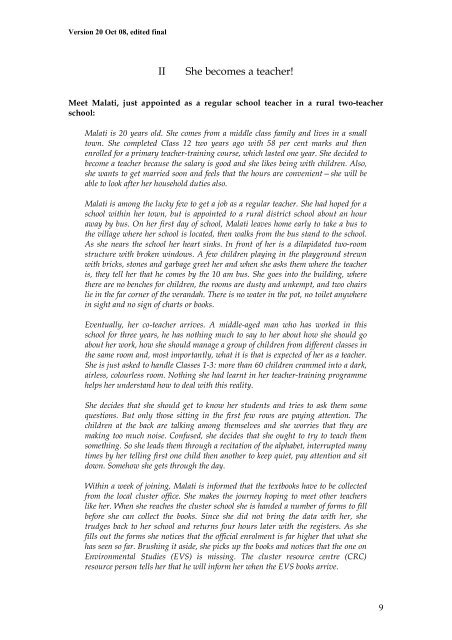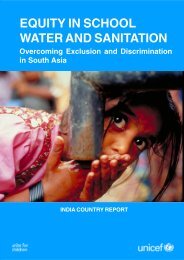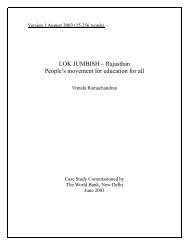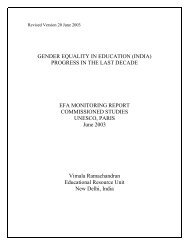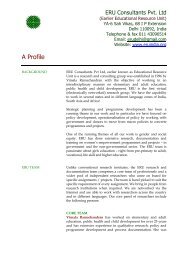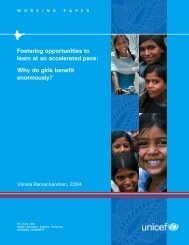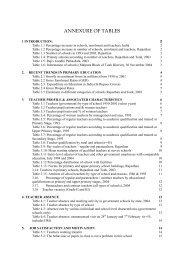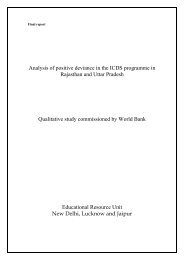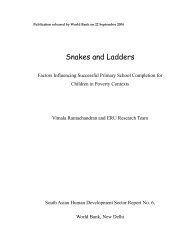primary school teachers the twists and turns of everyday practice
primary school teachers the twists and turns of everyday practice
primary school teachers the twists and turns of everyday practice
You also want an ePaper? Increase the reach of your titles
YUMPU automatically turns print PDFs into web optimized ePapers that Google loves.
Version 20 Oct 08, edited final<br />
II<br />
She becomes a teacher!<br />
Meet Malati, just appointed as a regular <strong>school</strong> teacher in a rural two-teacher<br />
<strong>school</strong>:<br />
Malati is 20 years old. She comes from a middle class family <strong>and</strong> lives in a small<br />
town. She completed Class 12 two years ago with 58 per cent marks <strong>and</strong> <strong>the</strong>n<br />
enrolled for a <strong>primary</strong> teacher-training course, which lasted one year. She decided to<br />
become a teacher because <strong>the</strong> salary is good <strong>and</strong> she likes being with children. Also,<br />
she wants to get married soon <strong>and</strong> feels that <strong>the</strong> hours are convenient—she will be<br />
able to look after her household duties also.<br />
Malati is among <strong>the</strong> lucky few to get a job as a regular teacher. She had hoped for a<br />
<strong>school</strong> within her town, but is appointed to a rural district <strong>school</strong> about an hour<br />
away by bus. On her first day <strong>of</strong> <strong>school</strong>, Malati leaves home early to take a bus to<br />
<strong>the</strong> village where her <strong>school</strong> is located, <strong>the</strong>n walks from <strong>the</strong> bus st<strong>and</strong> to <strong>the</strong> <strong>school</strong>.<br />
As she nears <strong>the</strong> <strong>school</strong> her heart sinks. In front <strong>of</strong> her is a dilapidated two-room<br />
structure with broken windows. A few children playing in <strong>the</strong> playground strewn<br />
with bricks, stones <strong>and</strong> garbage greet her <strong>and</strong> when she asks <strong>the</strong>m where <strong>the</strong> teacher<br />
is, <strong>the</strong>y tell her that he comes by <strong>the</strong> 10 am bus. She goes into <strong>the</strong> building, where<br />
<strong>the</strong>re are no benches for children, <strong>the</strong> rooms are dusty <strong>and</strong> unkempt, <strong>and</strong> two chairs<br />
lie in <strong>the</strong> far corner <strong>of</strong> <strong>the</strong> ver<strong>and</strong>ah. There is no water in <strong>the</strong> pot, no toilet anywhere<br />
in sight <strong>and</strong> no sign <strong>of</strong> charts or books.<br />
Eventually, her co-teacher arrives. A middle-aged man who has worked in this<br />
<strong>school</strong> for three years, he has nothing much to say to her about how she should go<br />
about her work, how she should manage a group <strong>of</strong> children from different classes in<br />
<strong>the</strong> same room <strong>and</strong>, most importantly, what it is that is expected <strong>of</strong> her as a teacher.<br />
She is just asked to h<strong>and</strong>le Classes 1-3: more than 60 children crammed into a dark,<br />
airless, colourless room. Nothing she had learnt in her teacher-training programme<br />
helps her underst<strong>and</strong> how to deal with this reality.<br />
She decides that she should get to know her students <strong>and</strong> tries to ask <strong>the</strong>m some<br />
questions. But only those sitting in <strong>the</strong> first few rows are paying attention. The<br />
children at <strong>the</strong> back are talking among <strong>the</strong>mselves <strong>and</strong> she worries that <strong>the</strong>y are<br />
making too much noise. Confused, she decides that she ought to try to teach <strong>the</strong>m<br />
something. So she leads <strong>the</strong>m through a recitation <strong>of</strong> <strong>the</strong> alphabet, interrupted many<br />
times by her telling first one child <strong>the</strong>n ano<strong>the</strong>r to keep quiet, pay attention <strong>and</strong> sit<br />
down. Somehow she gets through <strong>the</strong> day.<br />
Within a week <strong>of</strong> joining, Malati is informed that <strong>the</strong> textbooks have to be collected<br />
from <strong>the</strong> local cluster <strong>of</strong>fice. She makes <strong>the</strong> journey hoping to meet o<strong>the</strong>r <strong>teachers</strong><br />
like her. When she reaches <strong>the</strong> cluster <strong>school</strong> she is h<strong>and</strong>ed a number <strong>of</strong> forms to fill<br />
before she can collect <strong>the</strong> books. Since she did not bring <strong>the</strong> data with her, she<br />
trudges back to her <strong>school</strong> <strong>and</strong> re<strong>turns</strong> four hours later with <strong>the</strong> registers. As she<br />
fills out <strong>the</strong> forms she notices that <strong>the</strong> <strong>of</strong>ficial enrolment is far higher that what she<br />
has seen so far. Brushing it aside, she picks up <strong>the</strong> books <strong>and</strong> notices that <strong>the</strong> one on<br />
Environmental Studies (EVS) is missing. The cluster resource centre (CRC)<br />
resource person tells her that he will inform her when <strong>the</strong> EVS books arrive.<br />
9


